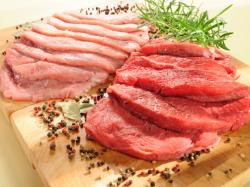AMSA Reciprocal Meat Conference To Offer Specialized Workshops & Hands-On Training
April 17, 2014 | 3 min to read

Champaign IL – The American Meat Science Association (AMSA) Reciprocal Meat Conference (RMC) planning committee is excited to announce five new extended sessions that will provide specialized training for attendees of the AMSA 67th RMC. These extended sessions include culinary aspects of product research and development; media training for meat scientists; processed meats evaluation; basic science and technical writing; and research priorities for meat science funding.
The sessions take place on Wednesday, June 18th from 9:30 am – 12:30 pm giving attendees plenty of time to catch afternoon departures out of Madison, WI. RMC registrants will receive a survey in early May to sign up for the workshops. AMSA will also be hosting a Hot Topics Session on Wednesday, June 18th from 9:30 am – 12:00 pm covering a variety of topics to provide attendees with the latest information, so watch your email for more information on this session in late April.
Culinary Aspects of Product Research and Development: Research and development is the engine that drives growth for any business. This workshop is designed to bring chefs and culinary experts together so they can answer attendee questions and help them understand the importance of research and development. Attendees will have the opportunity to be given a product that they must create and commercialize using supplier ingredients on hand and various plant equipment. This workshop will feature Chef Scott Walnofer, Kerry Foods; Chef Thomas Wenrich, Tyson Foods, Inc. and Jason Behrends, Tyson Foods, Inc.
Media Training for Meat Scientists: Information – and misinformation – floods inboxes faster than a blink of an eye, AMSA members are needed now more than ever to be the voice of our industry. Consumers have a thirst for knowledge and it’s up to us to tell our story and provide the voice of reason. This interactive session will be targeted to AMSA’s media expert members first to give them the basic training they need to be our voice. Daren Williams, National Cattlemen’s Beef Association, will help attendees understand their role within an interview, how to be the voice of science and how to deliver their message in a clear and concise manner. Attendees that are interested in a more specialized training, including on camera interviews, will have the opportunity in early May to register for this additional session on Wednesday, June 18 from 1:00-5:00 pm.
Processed Meats Evaluation Workshop and Contest: As the processed meats industry continues expand, it is important for students to have exposure to this sector of the industry. This workshop will give an overview of the current processed meats industry, the importance of the meat block, and the evaluation criteria for processed meats based on AAMP standards and common defects that are commonly associated with processed meats. After the lecture portion, a processed meats contest will be available to challenge your knowledge and ability to detect differences among products, identify defects, among other attributes. The Processed Meats Evaluation Workshop is sponsored by Hawkins, Inc., and featured speakers in this workshop include, Drs. Benjy Mikel, BlendPak, Inc.; Brian Smith Hawkins, Inc. and Robert Campbell, Kayem Foods, Inc.
Basic Science and Technical Writing: This workshop will cover the technical and laboratory aspects of meat science and provide an overview of meat science starting with identification of a problem, applying laboratory techniques and the interpretation of data. This workshop is designed for undergraduate and first year graduate students wanting more hands on and specialized training. Speakers in this session include Cameron Faustman, University of Connecticut; Dr. Wes Schilling, Mississippi State University; and Drs. Shannon Cruzen and Kyle Grubbs from Iowa State University.
Research Priorities for Meat Science Funding: AMSA core ideology is to foster community and professional development among individuals who create and apply science to efficiently provide safe and high quality meat. To that end, we must ensure the long-term viability of the meat science field and AMSA has made it a priority to promote and champion the funding of meat science research. AMSA needs to develop research priorities that can be disseminated to our members, allied stakeholders, thought leaders, government and funding organizations to effectively communicate why meat science research is critical to the success of our industry but also the agricultural livelihood of Americans. This interactive session will begin the process to develop research priorities critical to meat science and AMSA.
The AMSA 67th Reciprocal Meat Conference (RMC) is June 15-18, 2014, at the University of Wisconsin-Madison. For more information regarding the AMSA 67th RMC please visit: http://www.meatscience.org/rmc or contact Deidrea Mabry 1-800-517-AMSA ext. 12.
AMSA fosters community and professional development among individuals who create and apply science to efficiently provide safe and high quality meat (defined as red meat (beef, pork and lamb), poultry, fish/seafood and meat from other managed species).
Source: American Meat Science Association
